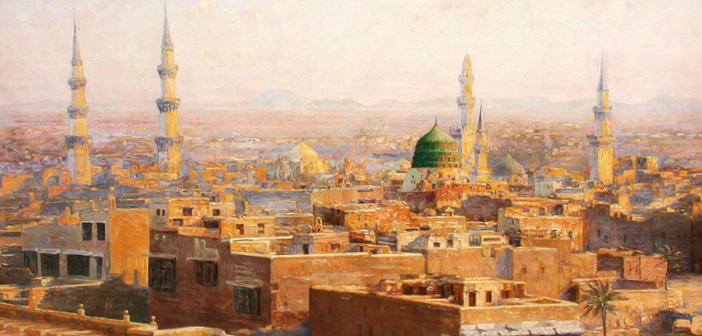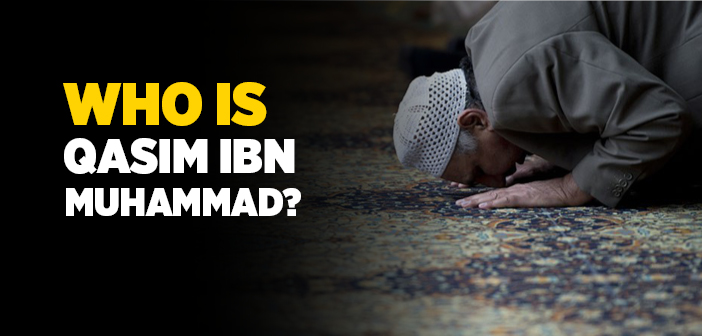Who is Abu Ayyub al-Ansari? What kind of person Abu Ayyub al-Ansari? When did Abu Ayyub al-Ansari live?
Blessed with the honor of having the greatest of all Prophets -upon him blessings and peace- as guest for seven months in his warm double story home, Abu Ayyub -Allah be well-pleased with him- at first constantly pleaded the Prophet -upon him blessings and peace- to stay on the top floor, only to have him respond each time:<
“Rest assured, Abu Ayyub…The ground floor is better for us and more useful.” Hence, the ground floor was where the Blessed Prophet -upon him blessings and peace- initially took up residence.
Serving their guest of honor, the Messenger of Allah -upon him blessings and peace- , with exceptional love and respect, Abu Ayyub -Allah be well-pleased with him- and his family even would even brush up against the walls to sleep, uncomfortable with the idea of sleeping on the same vertical level with the Noble Prophet -upon him blessings and peace-.
Their jug broke once, spilling all the water on the floor. Worried that the water might drip on their sacred guest, Abu Ayyub at once grabbed their one and only cover, a velvet blanket, and anxiously began drying the floor. Come morning, he insisted the Messenger of Allah -upon him blessings and peace- to move upstairs. As much as the Blessed Prophet -upon him blessings and peace- assured him that he was comfortable on the ground floor, Abu Ayyub -Allah be well-pleased with him- politely persisted:
“We cannot go upstairs, until you do!” It was only then that they swapped places.[1]
Whilst they had the Noble Messenger -upon him blessings and peace- as guest, Abu Ayyub al-Ansari and his family would offer him from the meals they prepared. When the leftover food was returned, Abu Ayyub would search for the parts of the food which the Messenger of Allah -upon him blessings and peace- had touched, specifically eating from those parts for tabarruk, in hope of attaining blessings therefrom. He had once sent the Blessed Prophet -upon him blessings and peace- a dish containing onions and garlic, which was returned untouched. Unable to see the Prophet’s -upon him blessings and peace- imprints on the food, Abu Ayyub -Allah be well-pleased with him- apprehensively went next to him and asked:
“Is that food impermissible, Messenger of Allah?”
“No, it is not”, replied the Prophet of Grace -upon him blessings and peace- . “But I was not fond of its smell, for I am a man who speaks with angels.”
“If you dislike it, then so do I”, said Abu Ayyub.
“But you should eat it”, the Messenger of Allah -upon him blessings and peace- advised, however.
Nevertheless, that was the last time they cooked that particular meal for the Prophet of Allah -upon him blessings and peace-.[2]
How splendid a case in point this serves, in indicating the degree of sensitivity and thoughtfulness the Blessed Prophet -upon him blessings and peace- had in abstaining from causing the least amount of discomfort to all beings, humans and angels alike.
Abu Ayyub’s -Allah be well-pleased with him- honor and respect towards the Blessed Prophet -upon him blessings and peace- continued unalloyed even after his temporary stay. Just to be among those to reap the inherent blessings of the below words of the Prophet -upon him blessings and peace- :
“Constantinople will certainly be unlocked…How wonderul a commander is its commander; and how wonderful soldiers those soldiers are”, (Ahmad, IV, 335; Hakim, IV, 468/8300), though well past eighty years of age, Abu Ayyub took part in two sieges of the coveted city, and as a vanguard of the ultimate conquest that was to take place many centuries down the track, gave his life for the cause. Moments before his passing away, as if to nominate his corpse as an object of ambition for Muslim soldiers to claim the city after him, he said, to those standing around:
“Bury me at the furthermost point you tread…”[3]
[1] Muslim, Ashriba, 171; Ibn Hisham, II, 116.
[2] Muslim, Ashriba, 170-171; Ibn Hisham, II, 116.
[3] See, Ibn Saad, III, 484-485.
Source: Osman Nuri Topbaş, The Prophet Muhammed Mustafa the Elect II, Erkam Publications





